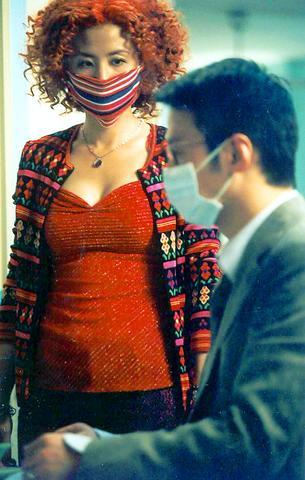Golden Chicken II (金雞II) offers more of the same comedic qualities in the first movie, offering both neurotic compulsion and cheesy sentiment that can make you laugh all the way at small, possibly meaningless things. It has a less straight-forward storyline, some of the anecdotes are more vulgar than funny, but the excellent acting of Sandra Ng (吳君如) and Jackie Cheung (張學友) saves it from becoming slapstick.
The story of Kam, the lead actress in Golden Chicken, can be looked on as a Hong Kong version of Forrest Gump. The counterpart for Gump is now a prostitute. Through her life story working in tea houses, high-class brothels and massage parlors, she witnesses the ups and downs of Hong Kong's economy and societal changes between the 1980s and 2000.
Treated as a joke among the girls in the brothel, Kam is nevertheless always optimistic, struggling to survive, no matter how weirdly or nastily her clients or bosses treat her. Golden Chicken IIis set in the year 2046, when Kam is already 82. In order to save a young man from committing suicide, she tells about her lowest days in year 2003.

It was an unlucky year for Hong Kong when SARS was hitting the region, and when half a million citizens marched on the streets for democracy and increasing numbers of Chinese tourists were visiting the former colony.
During the SARS period, Kam sees a doctor (Leon Lai, (黎明)), who works at a SARS hospital and always comes to her tea house for pork rice. She also receives a bizarre client who doesn't want sex but likes to collect body hairs from her. At the end this client turns out to be a mental patient who used to live in the residence where the SARS outbreak centered.
For non-Hong Kong viewers, some of the fun here is that the movie offers a nostalgic look at the city. It is very different from previous Hong Kong comedies which don't usually express a sense of history.
Recently, more Hong Kong movies -- such as Infernal Affairs (無間道) -- have self-consciously talked about the authors' own Hong Kong experiences. The vulgar part of the film, the SARS anecdotes, is followed by a secretive love story between Kam and her mainland cousin Quincy (Jackie Cheung), which looks more like a real story and brings out more drama. Quincy came to Hong Kong from China in the 1980s when Kam was a student. He and Kam vowed to each other they would make a fortune by the time they were old. Kam makes it with her body, but Quincy doesn't, instead he takes Kam's money and scorns her feelings for him. The puppy love becomes an on-and-off relationship.
Jackie Cheung vividly plays the character who is more drawn to capitalism than any Hong Konger. Twenty years after first meeting her, Quincy meets Kam again. Although old habits die hard, Quincy and Kam's relationship has an interesting turn that brings tears and laughter together.
At the end, when time goes forward to to 2046, Andy Lau (劉德華) becomes the chief executive of Hong Kong and offers a dollop of sarcasm about current chief executive Tung Chee-hua (董建華).

April 28 to May 4 During the Japanese colonial era, a city’s “first” high school typically served Japanese students, while Taiwanese attended the “second” high school. Only in Taichung was this reversed. That’s because when Taichung First High School opened its doors on May 1, 1915 to serve Taiwanese students who were previously barred from secondary education, it was the only high school in town. Former principal Hideo Azukisawa threatened to quit when the government in 1922 attempted to transfer the “first” designation to a new local high school for Japanese students, leading to this unusual situation. Prior to the Taichung First

The Ministry of Education last month proposed a nationwide ban on mobile devices in schools, aiming to curb concerns over student phone addiction. Under the revised regulation, which will take effect in August, teachers and schools will be required to collect mobile devices — including phones, laptops and wearables devices — for safekeeping during school hours, unless they are being used for educational purposes. For Chang Fong-ching (張鳳琴), the ban will have a positive impact. “It’s a good move,” says the professor in the department of

On April 17, Chinese Nationalist Party (KMT) Chairman Eric Chu (朱立倫) launched a bold campaign to revive and revitalize the KMT base by calling for an impromptu rally at the Taipei prosecutor’s offices to protest recent arrests of KMT recall campaigners over allegations of forgery and fraud involving signatures of dead voters. The protest had no time to apply for permits and was illegal, but that played into the sense of opposition grievance at alleged weaponization of the judiciary by the Democratic Progressive Party (DPP) to “annihilate” the opposition parties. Blamed for faltering recall campaigns and faced with a KMT chair

Article 2 of the Additional Articles of the Constitution of the Republic of China (中華民國憲法增修條文) stipulates that upon a vote of no confidence in the premier, the president can dissolve the legislature within 10 days. If the legislature is dissolved, a new legislative election must be held within 60 days, and the legislators’ terms will then be reckoned from that election. Two weeks ago Taipei Mayor Chiang Wan-an (蔣萬安) of the Chinese Nationalist Party (KMT) proposed that the legislature hold a vote of no confidence in the premier and dare the president to dissolve the legislature. The legislature is currently controlled